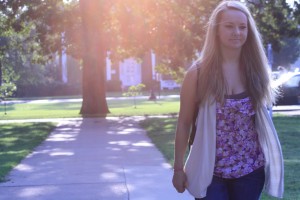Corneilus Hocker
Contributing Writer

New faces come with every school year.
But this year a younger crowd has been added to the Murray State mix.
Racer Academy, a program that provides high school students with college credit, is the only Murray State program of its kind, Renae Duncan, associate provost for undergraduate education, said.
Duncan said in addition to traditional on-campus classes, one of the highlights of the program is online classes.
With online classes, high school students hours away from Murray State can take courses for $100 per three-hour course.
Duncan said the University’s decision to implement the program last year was timely, considering the Kentucky General Assembly’s initiative to increase college readiness in high schools.
Racer Academy students are held to the same standards as Murray State students, Duncan said.
Students must have a 3.0 GPA and an ACT composite score of 18.
With 252 students from nine schools, taking courses, Racer Academy is reaching many students, Duncan said.
Laura Crouse, Calloway County High School guidance counselor, spoke highly of the Racer Academy.
“Most of the students from Calloway County High School take courses on Murray State’s Campus,” she said.
Crouse said the financial relief it provides to local families is an important face of the program.
Crouse’s daughter, Emily, said she is beginning to realize the differences between high school and college coursework.
“The expectations of a college course are different from my high school courses,” Crouse said. “In high school, the teachers hassle you about not turning in your homework and allow you to turn in missed assignments. There are also many tests. In my college courses, there aren’t many tests, and teachers don’t beg you for homework.”
Adam Eckles, from Murray High School, is also a student in the Racer Academy. He said the potential heterogeneity of courses in higher education is just a little intimidating.
“I’m worried about the other people in class with me,” he said. “The work will come to me fine, but having to work with people who could potentially be four or five years older than me is somewhat off-putting.”
Increased college readiness is an advantage of the program, but Duncan emphasized the financial benefit of the Racer Academy.
Duncan said a guidance counselor from one of the far western Kentucky counties thanked her for this affordable opportunity for her students.
“This guidance counselor had students that, because of socio-economic reasons, never thought college was ever an option for them,” she said. “They figured their high school diploma would suffice and that was the end of it. By taking classes through Racer Academy, college will be creating a reality for students that used to think of college as a place where they could never see themselves.”
University President Randy Dunn said his experience in secondary education drove him to work closely with local high schools in offering the University’s services to those in need.
“We have needs in many of the high schools within our region to help them strengthen their curricula and offer program supports,” Dunn said. “Given that my background is in K-12 education, I really feel compelled that we need to be doing more to take the capacity of the University and help them.”
Contact Hocker